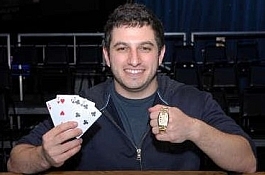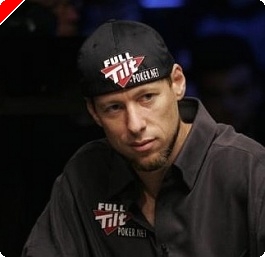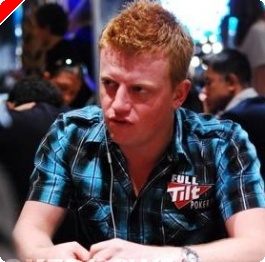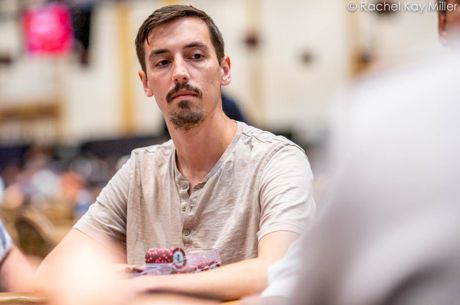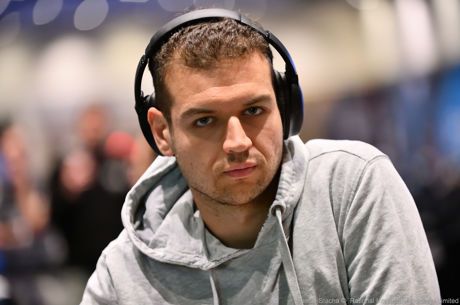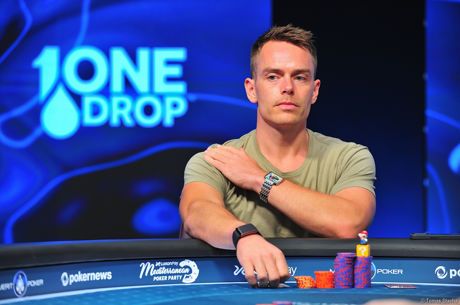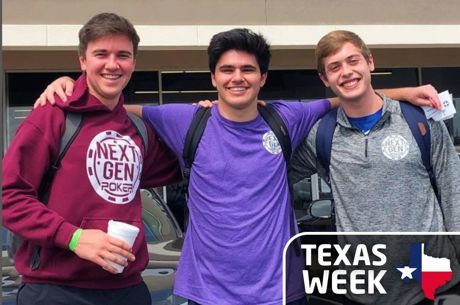The PokerNews Interview: Andy Bloch
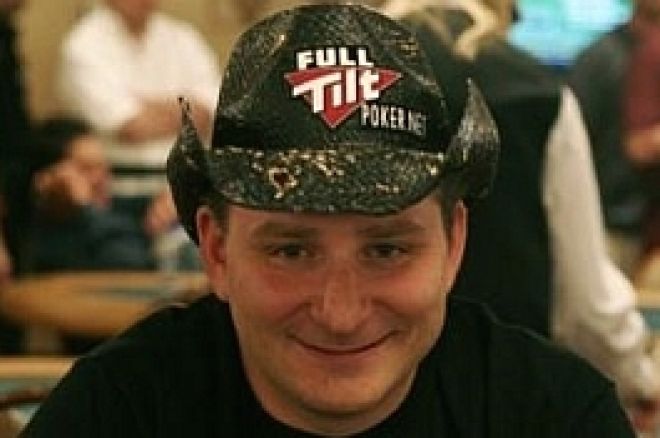
Since winning his first poker tournament in 1993, Andy Bloch has amassed over $4 million in tournament winnings while also picking up a couple of electrical engineering degrees from M.I.T. and a law degree from Harvard. In addition to his two World Poker Tour final tables, the Full Tilt Poker pro has 20 cashes in WSOP and WSOPE events, including seven final tables and two runner-ups. Proving Bloch’s expertise in many forms of poker, those seven final tables came in seven different games: no-limit hold’em, limit hold’em, pot-limit hold’em, seven-card stud, razz, pot-limit Omaha, and H.O.R.S.E. And Bloch bubbled the final table of a limit 2-7 triple draw event at the 2007 WSOP, as well.
Shortly after returning from the PokerStars.com European Poker Tour Monte Carlo Grand Final, Bloch spoke with PokerNews about a variety of topics, including blackjack (another card game in which Bloch has proven his mettle), the current legal situation faced by online poker, Annie Duke’s run on Celebrity Apprentice, the structures at last month’s World Poker Tour Championship, and the upcoming World Series of Poker.
PokerNews: Most of our readers are aware of your background, including your experience in the 1990s with the MIT blackjack team. You are still barred from some casinos, correct?
Andy Bloch: That’s correct. Most places in Europe. And the one in London where the World Series of Poker Europe was held the last couple of years. When I’ve gone to register for the WSOPE, they’ve had to call up their supervisors first and get a special okay for me. As far as the U.S. is concerned, it varies from state to state. Most places I can play anything but blackjack, although some places will only let me play poker — they won’t even let me play the slot machines!
PN: Here’s a question about another game — chess. At the beginning of your chapter in the “Full Tilt Poker Strategy Guide: Tournament Edition” about preflop play in no-limit hold’em tournaments, you make a comparison between preflop play and opening moves in chess. How else would you say chess compares to poker?
Bloch: Well, there are obviously differences. In poker, there’s hidden information, so there’s some uncertainty, especially for the outcome of each individual hand. But as far as, say, the heads up game goes, there is an optimal strategy, and just as much an optimal strategy in poker as there is in chess, except in poker it’s not a fixed strategy. Sometimes you should be playing a hand one way, and sometimes a different way — to confuse your opponent.
There are other analogies, too. But people often say chess is a game of skill whereas poker is a game of chance. And that figures sometimes into legal debates. But, in reality... the line between a game of chance and a game of skill is a lot blurrier than most people think.
PN: Barney Frank (D-MA), Chair of the House Financial Services Committee, just this week introduced new legislation to counter the Unlawful Internet Gambling Enforcement Act (UIGEA). What are your thoughts regarding the current legal status of online poker?
Bloch: The online poker world needs some legislation. And we need regulation to make sure that there are mechanisms in place [to protect players when] there are allegations of cheating, to make sure that it is harder for children to access sites, and to make sure that problem gamblers have an easier time both getting help and getting themselves on self-exclusion lists.... That will make it better for the players because then the they will have a lot more confidence that the sites that they go and play on are going to take their interests seriously.
PN: Like a lot of people in the poker world, you have been following “Celebrity Apprentice” — in fact, you have been involved somewhat, having helped Annie Duke’s cause. What are your thoughts about how Annie is doing?
Bloch: Well, Annie has been doing great, obviously. She’s made it to the final — she’s heads-up against Joan Rivers. It’s great watching it, because I have known Annie for several years and been friends with her. I can watch Annie and look at her face and look at her reactions, and then I can look at Joan’s face and Joan’s reactions, and Annie is so much more in control of her emotions and of her actions. There are probably a few things that Annie has done that I might have done a little bit differently, but as far as all of the contestants on that game go, Annie has by far played it the best and in a very honorable way.
Some of the things that Joan has said to Annie are just, to me, inexcusable. And for Annie to just sit there and take it — with a smile on her face, some of the time — is just amazing. I mean, if Annie had said some of those things to Joan, Joan would have jumped up and stormed out of there and taken the elevator down and not come back up.
To me, it would be, I think, a travesty if somehow Donald Trump decided that Joan Rivers were to win. Nobody knows who won yet. They have the final live on Sunday. I’m planning to go to New York for that, and it will be very exciting. But, I mean, I just can’t imagine… if Joan Rivers wins, it’s going to be for some other reason than how well she played the game, because she should’ve been fired two or three times already.
PN: What was the problem at the WPT World Championship last month and the structure there?
Bloch: At the WPT Championship, the $25,000 buy-in, the Bellagio decided in order to compete with these “deep-stacked” tournaments in other casinos, they wanted now to give everybody at least four times their starting chips in every tournament. That meant that in the championship we started with 100,000 chips instead of just 50,000 [as in the past]. But they didn’t change the structure early on to offset [that change]. We still started with 50/100 blinds.
Now it is completely possible for a person to go broke in the first level, still, of a no-limit hold’em tournament, even with 1,000 big blinds. And I almost went broke. I had a straight flush and my opponent, in theory, could have had a higher straight flush, but he didn’t.... But that’s a complete outlier. I don’t know if anybody actually doubled up or busted out in the first level. Maybe one or two. But that’s such a tiny percentage, that for me it almost becomes kind of a wasted day when you only lose 5-10% of the field.
So very few people busted [on Day 1]. They only lost about half of the field in the first two days. And then there were some 50% jumps [in the blinds] on Day 3. At that point, you could have been cruising along with a good stack and then you get to a stage where all the money is going to go in on the flop for a lot of hands. To me, I’d much rather have those hands on the first day than to go through and play two whole days [and then be forced to gamble].
There’s actually a French physicist who did a whole bunch of research and wrote a paper about structures in poker tournaments. He found the size of the starting stacks doesn’t affect at all, really, the structure of the tournament later on. It basically is just the waste of a level, extending the tournament [unnecessarily]. If you’re trying to solve the problem of the players not having enough big blinds at the final table, the way to solve it is not by adding chips to the tournament. The way to solve it is by adding levels later on, or making the levels longer later, or finding some other way to speed up play so more hands get played per level.
PN: That leads to the next question — what are your thoughts regarding the “triple stacks” being introduced at this summer’s World Series of Poker [events at this year’s WSOP in which players will start with stacks representing three times the buy-in; e.g., 4,500 chips for $1,500 events]?
Bloch: Actually, for the Bellagio Championship [the deep starting stack] is almost not so bad, because it’s not like there’s another event that you’re going to go play the next day. But at the World Series, there’s a tournament every day and sometimes two tournaments [that one would like to play]. There’s a noon tournament and a 5:00 p.m. tournament… so for the 5:00 p.m. tournaments, especially, when they give you these extra chips but don’t start up at a higher level, what’s going to end up happening is you’re wasting an hour or two of people’s time, and way more people are going to make it to Day 2 in those tournaments and not be able to play in the next tournament at noon. That’s going to really significantly cut into how many people play these events.
PN: And since the 5:00 p.m. tourneys are often the non-no-limit hold’em tourneys, that could affect the turnout for those...
Bloch: Yes, and I love all these other games. I would try to play as many as I can. The problem, of course, is that I’m going to have to look at it and realize I’m probably going to have to skip the noon tournament the next day whenever I play a 5:00 p.m. tournament. Or play like a complete maniac, which isn’t something I want to do, either.
PN: What do you think the field is going to be like for the “40th Annual” $40,000 no-limit hold’em event [Event No. 2]?
Bloch: I’d like to see at least 250 in the field, that way there would be a $10 million prize pool. I actually think that’s probably a good guess as far as the numbers go. One problem is it is the first event, so some people say a lot of Europeans might not make it there early because they won’t want to spend the whole five weeks in the United States. But also, it’s a good thing that it is the first event, because nobody is going to still be in an earlier event that will make them miss it.
PN: Which events are you most looking forward to playing?
Bloch: I’m looking forward to the $40,000 event, first. And then, of course, the $50,000 H.O.R.S.E. event. And also all the $10,000 events that they are calling “World Championship” events, especially the mixed events and the other non-no-limit events.
PN: On your website you have a posted a transcript from a Full Tilt Poker chat from a while back. Someone asks the question “Do you have any bracelets?”
Bloch: [Laughs.]
PN: This was just after the 2006 WSOP, I believe, and you reply “I have 0.93 bracelets,” referring to your near-miss in the $50,000 H.O.R.S.E. that year [won by Chip Reese]. Last year you came very close again, finishing second in the $10,000 pot-limit hold’em event to Nenad Medic. Do you now have 0.97 bracelets?
Bloch: Ha ha, well, let’s see... it depends on how you want to add them up. In the H.O.R.S.E. event I got 0.93 because if you look at all of the hands in which [Reese was] all in, it was 93% of the time I should have won one of them. Last year, I actually only had Nenad all in one hand — it was a big three-way pot, and I had, I don’t know, a 20% chance of winning that one. [In the hand, Bloch had both remaining players Medic and Kathy Leibert all in, with Medic holding pocket queens, Bloch pocket nines, and Liebert pocket sixes. Medic won the hand.]
So if I had won that pot… then it goes to 1.13 bracelets, which is more than one! Or if you refer just to my chance of winning any bracelet, then it would go from 0.93 to 0.95... [laughs]. But just judging from the all-ins, I should have had at least one bracelet by now.
PN: So here comes the question... What would it mean to you to get that first bracelet?
Bloch: Well, it would mean I can finally stop...
PN: ...answering that question.
Bloch: Yes! And people also wouldn’t talk about me being one of the best players without a bracelet. But you know, a lot of my peers, a lot of poker pros, they are kind of surprised when they hear that I don’t have a bracelet yet. So, in some sense, it’s not like I need to win it to gain the respect of my peers, because in a lot of ways that’s showing that they have a lot of respect for my game already if they think that I must already have a bracelet.
It would be a great thing [to win one] and my goal for the World Series is to win a bracelet. But if I get second in a big event, I’d be pretty happy, too. I mean, I think I’d be happy getting second in the $40,000 event or the $50,000 H.O.R.S.E., or to make the final table of the Main Event. That would make me just as happy — maybe even happier — than winning a bracelet in any random event.
PN: Finally, everyone wants to know... what’s the story about the hat?
Bloch: I got the hat for a Halloween costume one year. Then I wore it in my blackjack DVD where I was portraying a particular Irish rock star. Then I just decided to wear it one poker tournament, just for fun. In that tournament, I had aces against aces, and I lost. So then I decided to keep wearing it just to prove that it wasn’t unlucky.
That was a couple of years ago at the World Series, and I made a couple of final tables that year including the $50,000 H.O.R.S.E. event in which I finished second against Chip Reese. So the hat kind of became my trademark a little bit. Although I haven’t been wearing it a lot when I’ve been traveling, because that hat doesn’t travel well. It gets crushed!
Get your PokerStars marketing code from PokerNews.com - The number One Poker Source on the internet.

